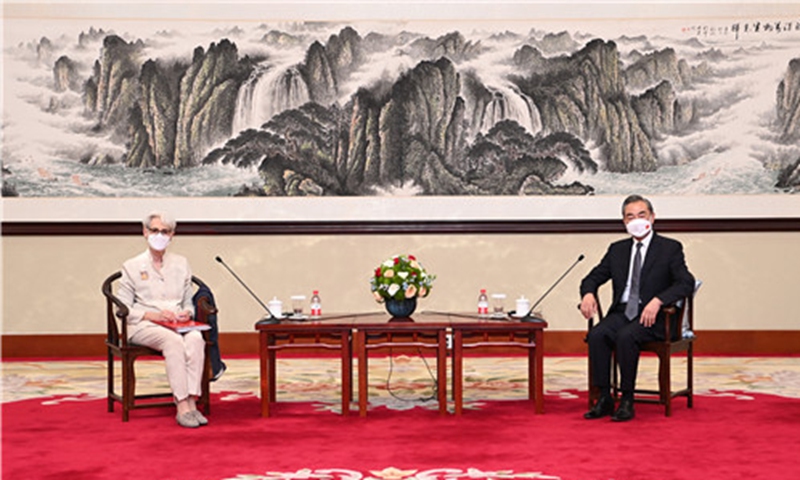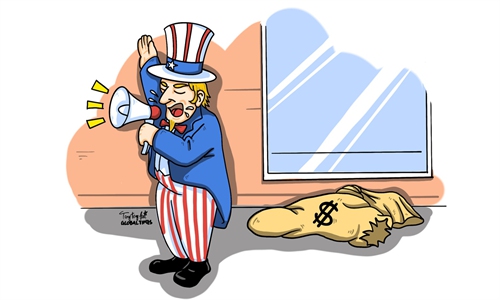Chinese State Councilor and Foreign Minister lays out China's bottom line at talks with Sherman

Chinese State Councilor and Foreign Minister, Wang Yi (right), meets with US Deputy Secretary of State, Wendy Sherman on Monday. Photo: fmprc.gov.cn
Chinese State Councilor and Foreign Minister, Wang Yi ,clarified three bottom lines that China upholds and the US should not challenge to prevent China-US relations from moving out of control during his meeting with US Deputy Secretary of State, Wendy Sherman on Monday.
As China-US relations currently face severe difficulties and challenges, the direction the two countries would go next, either towards confrontation or improved development, depends on the reflection and choice by the US, Wang said.
During the meeting with Sherman, Wang presented to the US China's bottom lines to prevent bilateral relations from going further downward. The US should not challenge, smear and seek to subvert China's socialist system with Chinese characteristics, should not interrupt China's development or interfere in its sovereignty.
He also emphasized that questions related to Xinjiang, Tibet or Hong Kong have never concerned human rights violations, but are all related to secessionist forces that cannot be tolerated in any country. When it comes to the question of Taiwan, it is one of China's core interests. The island is a part of the country, a fact that has never changed and never will.
Wang hopes that the US can have a correct understanding about China, give up its arrogance and bias and stop lecturing others.
When the US referred to the rule-based international order, Wang questioned its foundations adding that the US-proposed international rule is designed by them along with other countries. In the face of high tariffs imposed on Chinese goods in violation of WTO rules and the unilateral sanctions that violate international regulations, the US should be the one to reflect when it comes to follow international rules.
Such clear expression of China's position to the US shows that if the US cannot accept this bottom line, it may not be able to shoulder the severe consequences triggered by a further escalation of tensions in bilateral relations, Lü Xiang, a research fellow at the Chinese Academy of Social Sciences in Beijing, told the Global Times on Monday.
"China-US relations were close to a collapse under the Trump administration but China has acted in goodwill to stabilize the foundations of the relationship. After Biden won the election, China also showed its goodwill. However, the new administration has not changed Trump's China policy of escalating political warfare," he said.
It is clear that the Biden administration has the power and resources to change the current situation between the US and China but it is unlikely he and his staff will get rid of the current chaotic diplomacy and control their fear of a declining America, the expert noted.
What China wants to tell the US is that China's growth aims to seek happiness for Chinese people, not to challenge the US or take their place, the Chinese senior diplomat said during the meeting. As the largest developed country and largest developing country, the US and China cannot replace each other, nor beat one another.
"About where the bilateral relationship goes, China has been clear that the two countries need dialogue to find a way to coexist with different cultures and systems," Wang said, noting that it is hoped that the US will have an objective and correct understanding of China by giving up its arrogance and bias and stop lecturing others.
Sherman also noted that the US hopes that the two countries can coexist peacefully and the US has no intention of suppressing China's development. The two sides can work together on a number of international issues such as climate change, fight against drug and regional issues. She also emphasized the one-China policy by saying that the US does not support "Taiwan independence."


